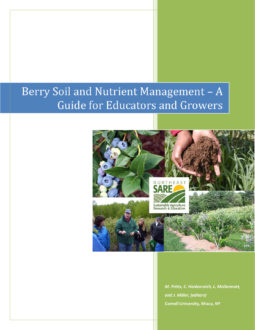Commercial berry growers in the Northeast have traditionally made standardized fertilizer applications based on crop age or past fertilization practices, and not on site-specific data of plant nutrient status. This practice continues today, some 20 years or more after commercial berry crop guidelines for analysis-based fertilization programs became widely available. Adoption of soil health improving practices (including the consideration of physical and biological soil properties) has also been slow.
Download the Berry Soil and Nutrient Management Guide for Educators and Growers.
Research demonstrates a soil and leaf analysis-based approach to berry crop nutrition provides increased yields along with improving fruit quality and plant health. Use of soil health management practices (i.e., cover cropping, reduced tillage, compost amendments etc.) has been shown to reduce weed, nematode and soil-borne disease pressure, along with improving soil tilth, organic matter and nutrient content. Rising costs of products and concerns about environmental impacts of fertilizers make a whole-farm approach to berry crop nutrient and soil management highly desirable.
This Cornell Cooperative Extension manual has been designed as a comprehensive resource for commercial berry growers interested in improving berry crop soil and nutrient management, and for the ag educators advising them.
Along with the manual, the authors produced a 12-part berry soil and nutrient management webinar series available through Cornell Extension. Complete information about these resources can be found on the Cornell Fruit website.
Want more information? See the related SARE grant:
This material is based upon work that is supported by the National Institute of Food and Agriculture, U.S. Department of Agriculture through the Sustainable Agriculture Research and Education (SARE) program. Any opinions, findings, conclusions, or recommendations expressed in this publication are those of the author(s) and should not be construed to represent any official USDA or U.S. Government determination or policy.
